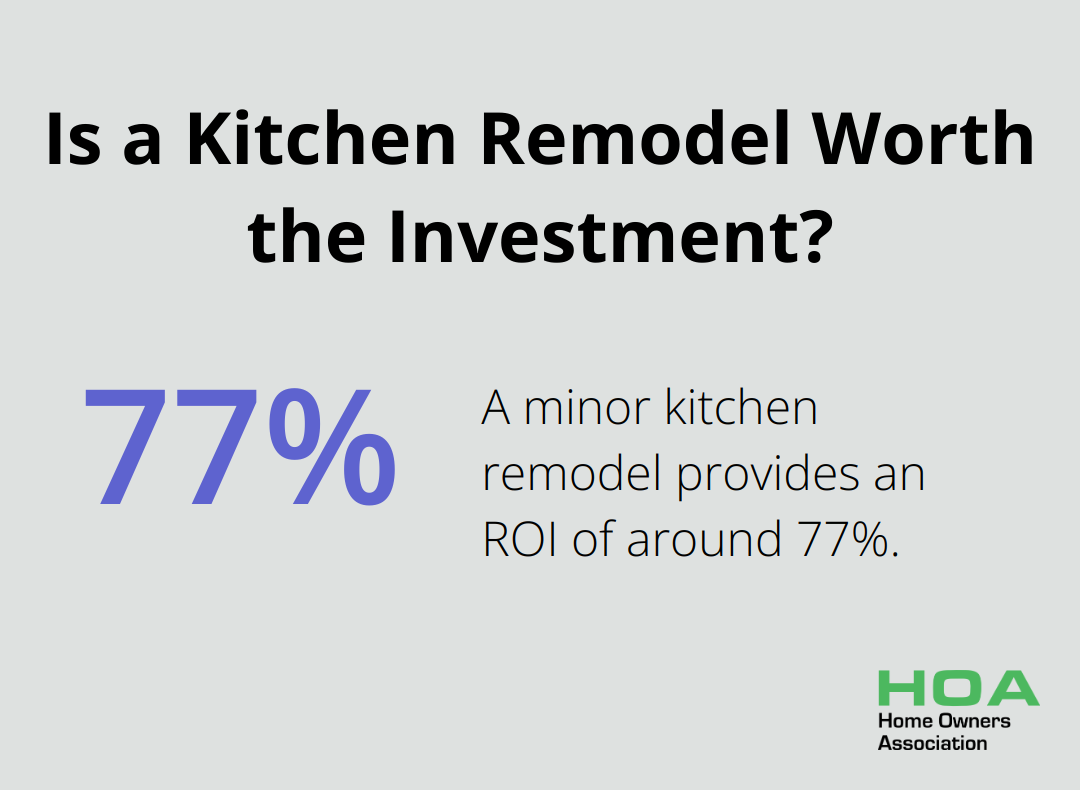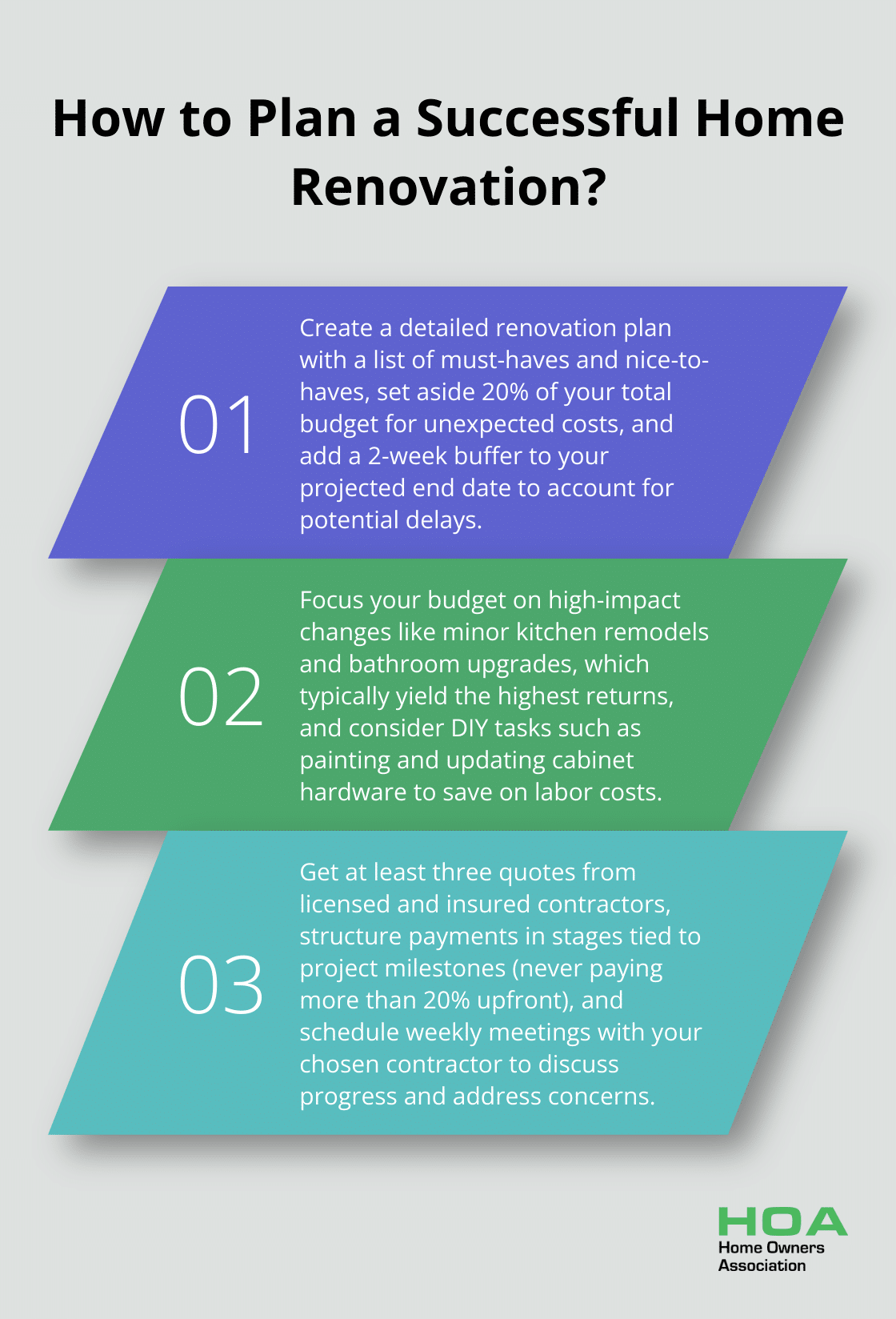
At Home Owners Association, we understand the transformative power of home renovations. A well-executed renovation can breathe new life into your living space, increase your property value, and enhance your overall quality of life.
In this guide, we’ll share essential home renovation tips to help you navigate the process with confidence and ease. Whether you’re planning a minor update or a major overhaul, these insights will set you on the path to success.
How to Plan Your Home Renovation
Define Your Vision
Start by clearly outlining your renovation goals. Do you want to increase your home’s value for a future sale, or create your dream living space? Make a list of must-haves and nice-to-haves. This will help you prioritize when it’s time to make tough decisions.
Crunch the Numbers
Let’s talk money. A recent survey by Houzz revealed that homeowners recorded a significant 43% increase in median renovation spend at $30,000 in 2022. However, your budget will depend on the scope of your project. Set aside an additional 20% of your total budget for unexpected costs. This buffer can save you when surprises pop up during the renovation process.
Map Out Your Timeline
Create a realistic timeline. On average, a kitchen renovation takes 6 to 9 weeks, while a bathroom overhaul can be completed in 3-4 weeks. (These are just estimates.) Factors like material availability and contractor schedules can impact your timeline. Add a 2-week buffer to your projected end date to account for potential delays.
Navigate the Red Tape
Before you start tearing down walls, ensure you’re on the right side of the law. Each state and territory in Australia has different regulations regarding home renovations. For example, in New South Wales, you’ll need approval for most structural changes, while in Victoria, minor renovations might fall under the “exempt” category. Check with your local council to understand what permits you need. This step can prevent hefty fines down the road.
Assemble Your Team
Choose your renovation team wisely. This may include architects, designers, contractors, and suppliers. Research potential team members thoroughly, checking references and past work. (Don’t hesitate to ask for detailed portfolios.) Clear communication is key to a successful project, so establish open lines of communication from the start.

Planning isn’t just about avoiding pitfalls-it’s about maximizing your renovation’s potential. A well-planned renovation can transform your living space, increase your property value, and enhance your overall quality of life. As you move forward with your project, the next crucial step is to explore cost-effective renovation strategies that will help you make the most of your budget.
Smart Spending for Home Renovations
Prioritize High-Impact Changes
You can achieve stunning results without overspending by focusing your budget on areas that offer the biggest return on investment. The 2022 Cost vs. Value Report by Remodeling Magazine indicates that minor kitchen remodels and bathroom upgrades typically yield the highest returns. A minor kitchen remodel costs an average of $10,000 to $15,000 and provides an ROI of around 77%. Start with fresh paint, updated hardware, and new lighting fixtures-these small changes can dramatically transform a space without a hefty price tag.
Embrace the DIY Spirit
While complex tasks require professionals, many projects allow for a do-it-yourself approach. Painting, installing baseboards, or updating cabinet hardware are all manageable tasks that can save you significant labor costs. A study by the National Association of Realtors looked at the reasons for remodeling and the increased happiness found in the home once a project is completed. However, you should assess your skills realistically-botched DIY attempts can end up costing more in the long run.
Hunt for Deals and Discounts
Smart shopping can stretch your renovation budget further. Look for end-of-season sales, floor models, and slightly imperfect items that are heavily discounted. Many retailers offer significant savings during holiday weekends. For example, appliance stores often reduce prices by up to 40% during Black Friday sales. Don’t overlook online marketplaces and local salvage yards for unique, budget-friendly finds.
Upcycle and Repurpose
Before discarding old items, consider how you could repurpose them. That outdated dresser might transform into a perfect bathroom vanity with a fresh coat of paint and new hardware. A 2021 survey by Apartment Therapy found that 70% of respondents had upcycled furniture or decor items in the past year, with an average savings of $500 per project. Your creativity can lead to substantial savings.
Leverage Trade Pricing
Many homeowners’ associations offer access to trade pricing on a wide range of renovation materials, which can result in substantial savings. (Home Owners Association, for instance, provides this benefit to its members across Australia.) This advantage, combined with the strategies outlined above, can help you achieve a high-end look without the high-end price tag.

A successful renovation doesn’t depend on how much you spend, but on how wisely you allocate your resources. As you implement these cost-effective strategies, you’ll want to consider the next crucial step in your renovation journey: working effectively with contractors and suppliers to bring your vision to life.
Navigating Contractor Relationships
Sourcing the Right Professionals
We at Home Owners Association know that finding the right contractors can make or break your renovation project. Try to get at least three quotes from different contractors. This will give you a sense of the market rate and expose you to various approaches and ideas. A recent survey by the Housing Industry Association found that 65% of homeowners who obtained multiple quotes felt more confident in their final contractor choice.

Don’t focus solely on price. The cheapest option isn’t always the best value. Look for contractors who are licensed, insured, and have a solid track record. In Australia, each state has its own licensing requirements. (For example, in New South Wales, all building work valued at over $5,000 must be carried out by a licensed contractor.)
Vetting Your Choices
Once you’ve shortlisted potential contractors, it’s time to investigate further. Request references from past clients and, if possible, visit completed projects. This will give you a firsthand look at the quality of their work and how it holds up over time.
Check online reviews, but take them with a grain of salt. Look for patterns in feedback rather than focusing on one-off comments. The Australian Competition and Consumer Commission (ACCC) reports that 42% of consumers rely on online reviews when making decisions about tradespeople.
Negotiating Terms and Payments
When you’ve found your ideal contractor, it’s time to talk terms. Be clear about your budget from the outset. Most contractors will require a deposit, typically around 10% of the total project cost. However, never pay the full amount upfront.
Structure payments in stages tied to project milestones. Some builders prefer equal milestone payments, with 20% for each major stage like foundation, framing, and lock-up. The Master Builders Association recommends never paying more than 20% of the total cost before work begins.
Get everything in writing. A detailed contract should outline the scope of work, materials to be used, timeline, payment schedule, and warranties. This protects both you and the contractor from misunderstandings down the line.
Maintaining Clear Communication
Once work begins, regular check-ins are important. Schedule weekly meetings with your contractor to discuss progress, address any concerns, and make decisions on upcoming phases of the project. This proactive approach can prevent small issues from snowballing into major problems.
Be prepared for the unexpected. Renovations often uncover hidden issues, especially in older homes. Build some flexibility into your timeline and budget to accommodate these surprises.
A good contractor relationship is a partnership. While it’s important to voice your concerns, also be open to their expertise. They may have innovative solutions or alternatives that you haven’t considered. For a comprehensive guide on planning and executing a successful home makeover, check out our detailed resource.
Final Thoughts
Home renovation tips can transform your space with careful planning and smart budgeting. Set clear goals, establish a realistic budget, and create a detailed timeline to lay the foundation for success. Research local regulations and obtain necessary permits to avoid potential setbacks during your project.

Cost-effective strategies maximize your renovation budget. Focus on high-impact areas, consider DIY options for simple tasks, and shop for deals on materials to achieve stunning results without overspending. Take time to source the right professionals, check references, and negotiate terms to ensure a smooth working relationship with contractors.
For additional support throughout your renovation process, join the Home Owners Association. We offer benefits, expert advice, and access to trade pricing that can help make your home renovation journey more cost-effective. With the right approach and support, you will create the home of your dreams.





